By Jan Worth-Nelson with Tom Travis
The University of Michigan – Flint is “a beacon of hope” for the Flint community, UMF Chancellor Debasish Dutta declares, and he intends to keep it that way.
“I am committed to doing everything I can do to make the UM – Flint strong — financially strong, programmatically strong, and relevant to the region, its employers and so on,” he asserted in a recent interview.
Dutta met with EVM in his third floor office in University Pavilion and went more than twice over the half hour allocated for the conversation despite several reminders from his staff that time was up. He was joined by Robb King, UM – Flint director of marketing and communications. King did not comment during the interview.
The primary thrust of the interview was the so-called “Strategic Transformation” process underway at the downtown campus — a systematic undertaking to try to find a path forward in the face of a myriad of severe challenges — some of them existential.
Those include a 30 percent drop in enrollment since 2014, an “unacceptable” six-year graduation rate of 35 percent, a deficit of $7.3 million in the last fiscal year, and losses or declines in demand for programs in liberals arts such as English and Spanish..
“Let’s be honest here,” he said. “I’m trying to turn this place around. I didn’t create this mess…I did not. I came in August of ’19, opened the books, found a mess, and said, oh my God, let’s try to fix it…”
Dutta, who holds a Ph.D. from Purdue University and spent 20 years at UM – Ann Arbor as a mechanical engineering professor, came to Flint from one year at Rutgers University – New Brunswick, where he was chancellor. Before that, he was provost and executive vice president of academic affairs and diversity at Purdue University. Before that, he was at the University of Illinois–Champaign-Urbana, where he was associate provost and dean of the graduate program.
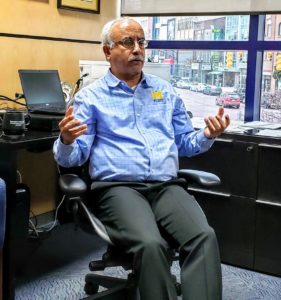
UM–Flint Chancellor Debasish Dutta, PhD. (Photo by Tom Travis)
He has a long familiarity with Flint; his wife, Fataneh Taghaboni-Dutta, Ph.D., was a faculty member of UM-Flint for nearly 20 years. His 2021 UM – Flint salary, obtained through open public sources, was $409,000. Contrary to rumor, according to King in answer to a follow-up question, Dutta does not own a home in Ann Arbor and lives in Ross House, the home provided in Woodlawn Park by UM – Flint for its chancellors.
“He lives in Flint and as long as he is chancellor, he will continue to live in Flint,” King said.
The Strategic Transformation process has featured many meetings, town halls, surveys, focus groups, soul-searching, extensive fiscal calculations, and program assessments. It also seems to be a circumstance in which not just the fiscal story but the essence of the university itself, a prominent feature in Flint since its start as a UM regional campus in 1956, are painstakingly under scrutiny.
“It took me a month and a half after I arrived to realize the financial situation, — whoa, whoa, what’s going on here? No one seems to care, everyone is just moving along like…wait, this is serious,” Dutta said. ‘At their October, 2019 meeting I shared it with the Regents… I said, this is a very serious situation. They were hearing it for the first time.”
Why and how UMF got into its predicaments it is “very clear,” Dutta said. — the institution has taken hits from its two main sources of revenue: tuition — the biggest source — and second, the state appropriation.
“State appropriation is barely keeping pace with inflation. So, it’s tuition. And just to remind everybody, our tuition is the third lowest in the state. We are trying to keep it at that, but there are bills to pay. The revenue and expenses have to line up. This year UMF started the year with $7.3 million deficit – that was before we had the full enrollment picture, with that enrollment picture now, it’s already higher than $7.3 million,” Dutta said.
He said he has tackled a double-barreled approach: finding ways to reduce expenses, and then exploring ways to increase revenue — to identify sources of potential growth.
The first approach, Dutta explained, began before the formal Strategic Transformation process kicked in — and it was a process that didn’t endear him to many.
“As you know, the way we balance the budget is to control expenses where possible, cut expenses, and we have done that. Do we have to continue? I hope not. I think we are down to the bones, I really think so,” he said.
He began in his own territory, he said: eliminating his office chief of staff position, reducing office expenses by 50 percent (he noted he handles his own emails, and makes most of his own appointments and travel arrangements) and most significantly, eliminating the position of vice chancellor of business and finance — taking on those duties himself — a move that saves several hundred thousand dollars.
He also declined to have an “installation ceremony” — typically a two-day “gala” — when he arrived which easily could have cost $150,000, he said — opting instead for a modest town hall with donuts from Carriage Town, an occasion at which he talked about what he considers to be core issues: student success, graduation rates, doubling the number of advisors.
“I’m just saying before I ask anybody to do some sacrifice, I’m doing it first. I walk the walk. I’m not a guy who’s just talking the talk,” he said.
“I know people say, This guy is such a miser. If people come to me and say, “this is going to cost less…” I go for it. I’m not doing it because that is fun, but because it’s necessary.”
Between a rock and a hard place
“Last year, against the advice of everyone, I held tuition flat…I was only one who did it [of the three UM campuses].. People said you’re crazy, man – but I’m between a rock and a hard place. It’s tough for our students and their families, but then again, I don’t have the revenue we need.”
Dutta and his UMF team have been the target of intense critique from some faculty, staff, students, and community members since the launch in September of the “Strategic Transformation” process after a charge from then-interim UM President Mary Sue Coleman.
Attempting to answer some of those critiques, Dutta flatly stated “No — nothing” has been pre-decided by the Ann Arbor administration; no, the controversial consultant hired to research the process is not calling the shots; and no, the liberal arts are absolutely needed and will not disappear from UM – Flint’s program options.
He said he regards the current state of the process as “at the end of Phase One,” — the time when the consultants’ work would be done and the campus would consider its findings — and predicted if not completed by the end of the year it would continue into early 2023.
Asked what he wanted the Flint community to know about the process, which has generated many fears, rumors and concerns — including parallels to Flint’s Auto World debacle and even the water crisis, Dutta replied,” The Strategic Transformation process is essential to the long-term viability, financial and programmatic viability of UM – Flint.
“UMF is a beacon of hope for the community, and I am committed to doing everything I can do to make UMF strong, financially strong, programmatically strong, and relevant to the region, its employers, and so forth.
Just after he arrived, he noted, “The pandemic hit — which changed the world…but now we are in a situation which I think will allow the institution to reposition itself. Enrollment will be stable. Flint, the community, will be better for it, because this change, once it takes hold, there will be vibrancy in the community. Just wait and see. This will impact the community positively, as sure as I sit here today.”
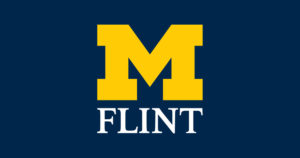
(Graphic source: www.umflint.edu)
Also, he said, “I want the state to recognize UM – Flint for its values.” Pointing to a Block M coaster on the coffee table in front of him, he said, “I want the Block M to mean something. I want to make sure that UM-Flint, like UM-Dearborn, is recognized as a part of Michigan – always delivering that quality.”
To help with the process, UM hired Huron Consultants Group, a nationally-known — some say notorious — group of higher education experts, whose work on other campuses in similar difficulties around the country often has resulted in major cuts — sometimes accused by some of “slash and burn,” — with an emphasis on market demand, growth predictions, and other elements regarded by some as applying a corporate model to academia.
Of the Huron critics, Dutta asserted, “They are being unfair, let me say this. What Huron did with New School, or Stevens Point [University of Wisconsin], those were different institutions, within a different context. They did what they did. They are a top notch firm. There’s no question about that. “
And he strongly objected to comments, warnings from some faculty that Huron would be telling UM – Flint what to do.
“If Huron were to give us, to take their strategy at the New School and apply it to us, and we didn’t understand it, shame on us. Whenever you hire a consultant, you have a role. You don’t let the consultant do whatever they want. That’s a very important thing to understand. The consultant works for you. The consultant doesn’t make the decisions. They give you options, you make the decisions. So what happened at those institutions, I don’t know. I can see, given the stress level and uncertainty and apprehension, [that people might be fearful] but NO, that is not the case.’
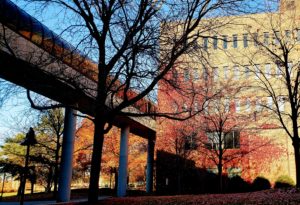
French Hall on the UM-Flint campus in downtown Flint. (Photo by Tom Travis)
He also strongly attempted to debunk speculations from some faculty that Ann Arbor already has a plan in mind for what will happen to the Flint campus, regardless of what the Strategic Transformation process produces.
What fuels that speculation in part is that in her 2022 charge letter, Coleman stated that if the UM – Flint meets certain milestones in its attempt to “transform,” Ann Arbor is prepared to make a financial investment here. Dutta contended the timing and amounts of those investments — which he compared to a loan — would be determined by milestones of how and when the campus meets its goals as determined by the Strategic Transformation process.
“Let me just say this, not to trivialize anything: Anytime anybody gives you a loan, a forgivable loan, they will want some milestones that you will hit. There must be something that I expect you to do…I’m not going to give you millions of dollars for a losing proposition. We have to be good stewards of those funds.
“When the Strategic Transformation process reaches that end of Phase One [when the report comes in, possibly later this month or early in 2023] makes recommendations to the Regents, and whatever is decided, at that point is when to determine what those milestones are. At this point we don’t know – and at that point it will be determined what those amounts would be.
“We are lucky to be part of the UM system that somebody is willing to invest millions of dollars, millions,” he said. “Any institutional transformation requires funds – because any Strategic Transformation means, doing things a different way. That requires investment.
UM–Flint Chancellor Debasish Dutta, PhD. (Photo by Tom Travis)
“We are lucky we have the flagship in Ann Arbor that is willing to invest in us. No other institution in the state has that kind of underwriter — it’s the ‘ace in a hole’ that Ann Arbor is willing to underwrite this thing. It’s a very good situation to be in: We find ourselves in a serious and urgent need of change, and and there is an organization 50 miles south that is willing to help us.
“Now it is our job to determine that course, that trajectory of which way we will go, collectively, faculty, students, staff, community, alums. No one can predict, no one has a crystal ball…we do the best we can, we keep our minds open, then change is needed.
“The liberal arts will never go away from Flint”
Dutta was perhaps the most animated when asked about the fate of the liberal arts and humanities, in contrast with higher-growth and higher-demand in the so-called STEM category: science, technology, engineering and math.
Because the initial Huron analyses emphasize market demand and growth predictions, many fear for the fate of the liberal arts, which have been at the heart of UM – Flint’s brand, but which have been experiencing marked and steady enrollment drops in line with nationwide trends for years. Those fears, along with actual cuts and program rearrangements in the College of Arts and Sciences (CAS) over the last two years, have prompted protests and concerned commentary from a vocal group of faculty, staff, students. and community members.
Asked if the non-growth departments will take the biggest hits, Dutta said “NOT TRUE. NOT TRUE.”
“I want to be very clear,” he stated. “So far, all the cuts you refer to were made in CAS by the previous dean. Program closures, the moratorium – and I’m not saying that she didn’t need to – she had to. It was made by the previous dean [Susan Gano Phillips] because the enrollments have been down, seriously, except for a few.
[Editor’s note: Gano Phillips was fired by Provost Sonja Feist-Price in June, partly in reaction to a disagreement about moving three units from CAS into the new College of Innovation and Technology (CIT). Gano Phillips has issued a series of fiery statements to the UM Regents at their October and November meetings alleging bullying and intimidation by UMF leadership — Dutta and Feist-Price. She has been awaiting a response.]
“The previous dean made those decisions, and she had to balance her budget: she closed certain programs, she put programs on moratorium. what you’re referring to is THAT. Those all happened prior to the Strategic Transformation,” Dutta said.
“Any administrator has to look at the resources she or he has available and to live within those resources. What the former dean did was what she thought was the right thing to do for the college. All of this happened prior to the Strategic Transformation. She had to do it.
However, he insisted, “Most importantly, I want your readers to know, no decisions about any area, any college, any program, has been made. NONE, ZERO. This is misinformation. Please do this institution a favor by not propagating this falsehood. They need to know. I understand the apprehension, the stress that comes with not knowing…that is not the reason why one would say that decisions have been made.”

The UM-Flint University Pavilion on Saginaw St. downtown Flint. (Photo by Tom Travis)
But he defended the need for the liberal arts to remain — as a part of the mix of courses in which the high-growth programs help subsidize the low-growth but important offerings.
” Think of it as a mutual fund,” he said. “In a mutual fund, you hold stocks of multiple companies … some are performing very well, doing well, some are not, but collectively, they yield good.
“Any institutions, any organization — GM, Ford – they have some lines that are very, very profitable, and some lines that are not. This institution is no different. There will be a few that will not be profitable, but still be essential to the core of this institution.
“We would want to protect that. I will protect that. But in order for me to protect that, I still need a few, or more than a few, that are profitable. If it comes to a point where I have one or two that are profitable, but 15 that are not, it’s not going to work.
“That is the reason we launched the Strategic Transformation process. So, yes, it might appear to you or others passionate about the humanities that, this is across the nation, that enrollment is declining, but we do understand that people who come here for an education, after they get a diploma, they want a career, they want a job. So we have to look at market trends, employer demands, including growth predictions.
“But that doesn’t mean, in fact, for sure as long as I’m in this job, it will not mean that I will be chasing numbers. I will not.
“I’ve been around 30 years in this business. ‘Cross subsidies’ — as in taking money from profitable program or colleges to subsidize others — is a routine thing – I have done it myself, I will do it here. But I need that flexibility, I need that ability that the revenue coming in that I can then invest.
“There are certain programs that are highly, highly unlikely to ever be profitable. I would keep them. A healthy mutual fund has to have everybody. But I need money from other sources. Many small colleges have donors, Oberlin, Wellesley, Amherst, small colleges can have strong liberal arts — they fund it through philanthropy, through donors.
“But we don’t have that – but we have to get it from within. We have to support it from the revenue we get to the institution as a whole. We will do as much as we can. The liberal arts will never go away, I can assure you of that. How much we are able to do, that depends.
“How you assess low growth – it’s a subjective thing – one or three students a year in a program, that’s going to be tough. But if it is music, the pedagogy is different. It has to be that. When I was in Ann Arbor, my class sizes were 180 students every semester in one class…I’[m used to that. Low growth, low enrollment still has a lot of gray in there, how low is low? Beyond a certain point, it is not sustainable.
Asked if Ann Arbor shares his perspective on the “mutual fund” approach, Dutta replied, “My job to convince them, and I’m prepared to do that. I need to be convinced myself. I have done this at other institutions, it is my job that this kind of an approach, even by standards we would consider low-growth, need to survive.
‘”The liberal arts will never go away from UM – Flint. Whoever is saying this is perpetrating misinformation, a falsehood. Even in the professions, they still have to have the core of the liberal arts. They’re not going away.”
UM-Flint and its “host community”
As of the date of the interview, Dutta and his team have hosted three community townhalls — two at local churches and one at Berston Field House.
“We had very good discussions,” he said. “To synthesize: they [Flint community members] want the University of Michigan – Flint to be successful. They are fully behind us, they want us to be wildly successful.
“They understand that UMF provides a very good education, which we do, and regrettably, we are not known for that.
“We re the ‘best kept secret’ – and that is not going to work. We have to communicate broadly not only in the region, across the in the state – that we have the third lowest tuition, small classes, high-quality education – why aren’t people banging down our doors to get in? I’m asking myself since my first days here.”
He attribute the problems to two factors:
“First, we probably have not marketed ourselves well…
“Second, our graduation rates:
“Our six -year graduation rate is 35 percent. That’s 15th out of the 15 universities in the state: This is a block M. Do you associate this with 15th out of 15? – NO. this is not acceptable. How can we accept the proposition that you’re putting Block M on an institution that has the lowest graduation rate in the state?
He sighed deeply.
“Fifteenth in the state in its graduation rate. We don’t even talk about it. When I talk about it, the faculty get angry with me –they think I am blaming them. I am blaming US: This is MICHIGAN — You cannot be last in the race. We have issues. If we don’t face up, if we don’t face the facts, this is never going to improve.”
Among interventions to address that issue, he says he’d like to beef up academic advising.
“I would like our advisor to student ratio to be like private schools – that is the level of support. We are not there yet, because we don’t have the funds. But I would like us to be middle of the pack…6th or 7th. I don’t need to be first, But not 15th? That is shameful.”
EVM asked about the interaction between UM – Flint and the C.S. Mott Foundation, which among other supports for the campus recently contributed $10 million to the renovation and expansion of the Murchie Science Building. He said they are actively engaged with what is going on.
As for future investments from the foundation, “They want to see a plan – they want to see metrics, and milestones – that’s exactly how it works. The point is, the Mott Foundation has to also see that the institution, its leadership, its rank and file, they are committed to the change.
“And when they see that, they will fund initiatives. I have tremendous respect for the Mott Foundation – where would this city be without them? God bless them.
“But also, I don’t like to go to places with hat in hand. Once in awhile, each of us need help, because we fall into bad times, but…what I’m saying is” this – I find myself as in UM – Flint in a serious serious situation. At this point, I’m willing to take help. I will accept help.
“But I will also be very mindful that this help is one time, to help you get up, pull your socks up and get going, fix it. I’m not the Chancellor who will agree to receiving ongoing subsidies from the flagship for here. No no. It changes the dynamics. .
“’ll take money from the state because everybody is taking money from the state – I’m a state institution. So a state, yes. But from Ann Arbor no, I don’t want to. But today, I will, because I’m in trouble. I appreciate their help, I will do everything I can to take their investment and to reconfigure the programs in a way that gives me a chance to be financially viable long into the future.
Dutta also called for patience, particularly from those who fear not enough about the community of Flint is reflected in the process and proposals so far.
“We want that element to be there,” he said. “That’s what I mean when I say the report will not be complete until we determine that it is a full-body of work to the extent that alumni, student, faculty is considered.
“What do I see as the connection? What do I want UMF to do for Flint? Our futures are intricately tied. What does that mean? I’ll tell you this: jobs. Flint is hurting today after GM went away, after everything else that happened…its economy is down, it is losing people — in the 2020 census, we lost 20,000 people. Come 2030 census, it might be the village of Flint.
“What can UMF do to help attract companies, businesses, jobs? That is how I view UMF, its role today – you’re a taxpayer funded – you have an obligation to create jobs in this community, and you’ve got to keep that front and center.
“So when I see our future – for example, we have started creating an environmental sustainability plan for the City of Flint [through the work of biology professor Heather Dawson, , executive director of the Office of Research and Economic Development]. That’s just one of the important areas where UM-Flint can say, rightly so, proudly, that we have done these things. Environmental sustainability…let’s do this.
“The other thing – not only did I eliminate positions, whatever money I have saved I have repurposed it into academics. I have not saved the money in the bank. Many things that are being done in the Office of Research were faculty programs funded out of the Chancellor’s office. I cut costs and I repurposed it. New programs for faculty have been 50 per cent funded from the Chancellor’s office, he said.
He also has initiated a set of “named faculty professorships,” for example, the Winegarden and Thompson professorships, which he says are a way “to recognize the faculty and core business of the institution — it is a university,” he said, “and we want to incentivize faculty scholarship and research — it’s what our students need and expect.
“I’m not interested in putting money in the bank…I want it to work for me. I want it to work for faculty,” he said.
“We are only two months into the process. Mary Sue Coleman said you don’t want these things to take three years, then you have lost the momentum. These changes happen on a very fast track. But… She recommended, getting it done by December and I agreed — let’s see if we can get the job done by the end of the semester, the first phase. I was okay with that.
“But I want everyone to know that the integrity of the process will not be shortchanged to meet the estimated timeline of December — unless it is done to the quality that I expect, I am not going to accept it.
“Detractors are very normal”
“I didn’t expect this to be a cake walk,” Dutta said.
“I accept that there are faculty who for whatever reason will never want this change, will never come around. There are some who have already come around, but there are some who have not. That is a vocal minority. Please let us not let that minority to speak for the entire institution.
“They have some good ideas, too, and they will certainly be considered. But this is a time when each of us have to let the institutional priorities override our personal priorities – as in “country first, party next ” in this political season.
“This is the time for UM-Flint to put aside English or management or nursing, and to think about the university as a whole.
“You tell me how to convey this to the community. I am happy if we have a sizable number who see the transformation and move with it. I’m not looking for 100 percent – it never happens.
“But what I’m most concerned about are falsehoods, allegations, which are unfounded, baseless, being thrown out and people are thinking all the decisions have been made. No decisions have been made. My goodness. I understand that I will go blue in my face but there will be some who still will think that.
“There are also a group of people who will say out loud that ‘we were not heard – because our ideas are not reflected in the outcome.’
“I hear you, but guess what, I disagree with you. In their minds, they can only hear me if you accept my ideas…like unless I win the election, it was rigged. That’s not the American Way. So just because my idea was not selected, does not mean my idea was not given due consideration.
“We are getting hundreds of ideas. We are doing the best we can. Each side has to cut some slack to the other. That’s why I’m saying, at the end of the day, is the institution important to you at this point, or is it your personal preference. This is the time – when it’s the institution that comes first.
“I tell it like it is. I am here not to hurt the institution, not to hurt any faculty here. I am here to save this institution, to make this institutionally financially viable, academically strong, for generations of students to come.
“If we can do this transformation, the future is really, really bright – just wait and see. It will really be good for the institution, for the students. It will really be good for Flint.”
EVM Consulting Editor Jan Worth-Nelson can be reached at janworth1118@gmail.com. EVM Editor Tom Travis contributed to this report and can be reached at tomntravis@gmail.com.

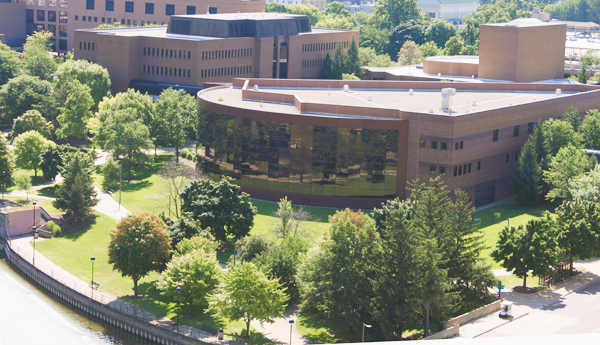
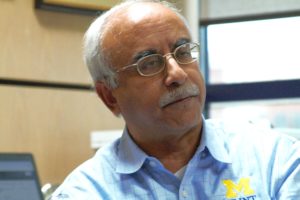

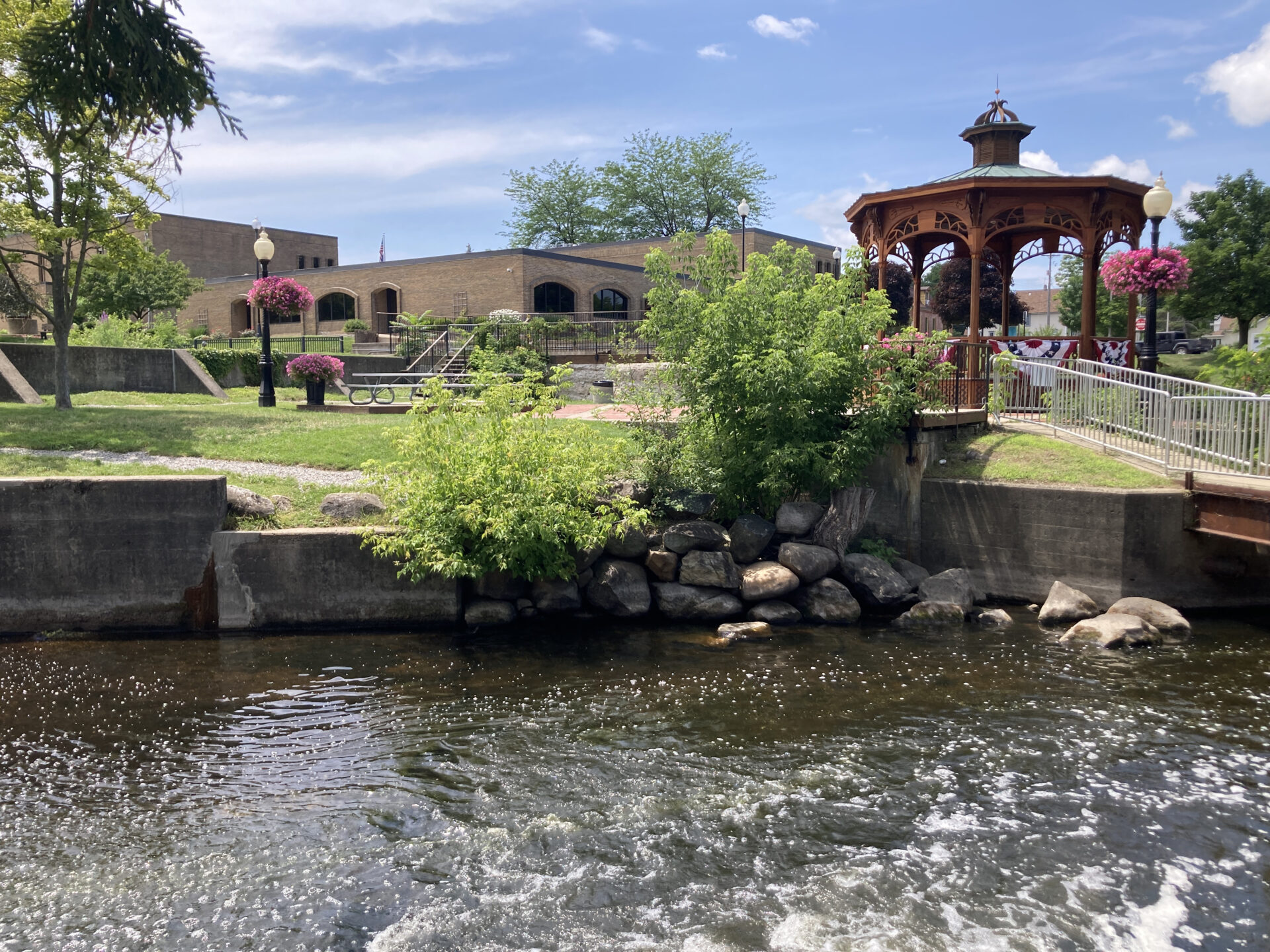


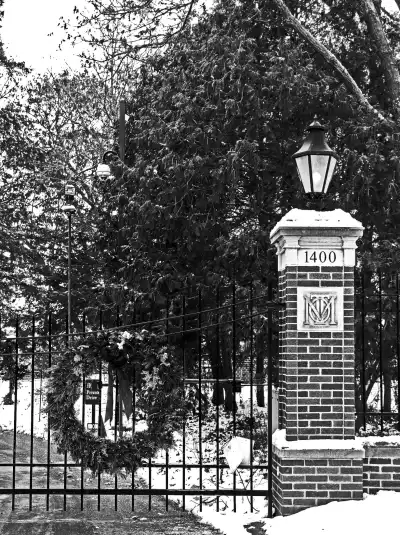

You must be logged in to post a comment.